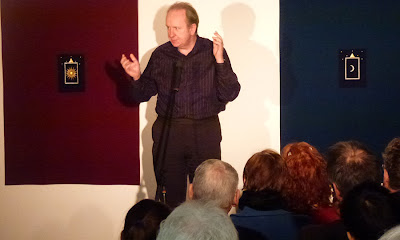I’m not criticising, you understand, but I do note that you haven’t told me how you cope with paper notebooks. Last week – no, wait, let me say this, I like saying this – Previously On Self Distract: I told you all about this business that my handwriting doesn’t look human. So I don’t handwrite, I type. And while I can understand that people deeply love their Moleskin notebooks, they’re no use to me unless they somehow decipher scrawling.
But this does leave me with a big mystery. I seriously wonder and have fruitlessly asked many people over the years: how do you find everything? You have this great big notebook, or this tiny wee thing, and you jot down everything in it, but how you do find anything? I’ve worked with people who were fantastically well organised and they seemed unable to forget a single thing, they were instantly able to pick up where they left off in the last meeting notes.
And the spookiest thing of all, for me watching them, was that no matter what the meeting or how many years it had been since the last one, they still had the notes with them. Don’t these things ever run out? I’ve got this image of you as a notebook demon who every morning picks out these stylish outfits you wear and then goes to some strange machine where all your notebooks are kept and it trundles through all of them until it reaches the one you’ll need today. I picture you with the pods that used to slide under Thunderbird 2 until it reached exactly the one with what today’s rescue mission needs.
Granted, I felt sure I was over-thinking all this and that there would be a simpler answer like “I just bluff well” but I thought you might tell me. I thought you might break ranks, break out from this Magician’s Circle of notebook users and tell me how in the name of God you can always have the right bloody notebook with you and it never fills up and you never lose anything and what great alchemy do you have that means you can read your own writing?
Instead, I got asked about Evernote.
I always have this thing that if I know something, everybody else knows it. And that everybody else knew it sooner than I did. This doesn’t stop me rushing up to you like a puppy when I’ve found out something, but it does mean that I’m used to you going yeah? So? And? Seriously? You just got this?
Prepare to do the same now, but it’d be nice if you did it nicely. If you’re an old hand at Evernote, we’re going to have words about why you didn’t tell me this thing existed. If you’re an old hand at paper notebooks, I’m going to try to recruit you to my side. Especially since it’s a series of revisions and improvements to Evernote these past few months that have turned it from nice yet a bit ugly into something I use near constantly.
You can keep your handwriting. But paper notebooks must go.
Join me.
(Please picture me slowly beckoning you and imagine I have wide eyes like a cult leader. It’s my new look.)
Join us.
Join us.
Evernote is free software and a service that you can use for no money, nowt, none up to a certain generous point that I never came close to exceeding. It can be a paid-for service if you want more features, and I do, so I subscribe. Angela bought me a year’s subscription for Christmas and I’m not going back.
Evernote is a service that runs on just about anything I’ve ever heard of anyone using: iPhones, iPad, Macs, any web browser you’re passing, everything. (Okay, also Android and Windows. I think Linux. Not sure there.)
And Evernote is just a service for making notes in. There are a million apps for writing notes in. And it’s not like we were lacking for ways to type notes before apps came along. I used to write articles in Word and when the phone rang I’d just carry on typing. I became known for my surreal writing style because I cannot tell you how many features nearly went to press with a paragraph in the middle saying “Burt rang, needs spanner back”.
That doesn’t happen now because wherever I am, Evernote is a flick or a tap or a keystroke away and if I’ve got that phone crooked under my aching neck, I’m typing a little jotted note. When I hang up, maybe I’ll chuck the note away, maybe I’ll pass it off to my OmniFocus task list to work on later, most likely I’ll save it in Evernote knowing that this means I will always be able to find it again.
I make notes in Evernote. I don’t lose anything. I have every note I’ve ever written and I have them all wherever I am. I can find it all instantly. Surprise me with a board meeting and I’ll surprise you with last month’s minutes and the fact that I’ve done everything I said I would. (Though, to be fair, I’ll have leaned on OmniFocus more than Evernote for that.) But then when we’re in a shop, ask me what recipe your third-aunt-twice-removed said could use Oregano. If I’m on the phone with Eon yet again, then here’s what exciting adventures I had with you the last five times I rang.
(Just an aside: Eon plays the same music every time I phone up and am put on hold. Not the same type of music, not the same artist, not the same album, but the exact same track on a loop. It got so I was singing along with it. And eventually I told the Eon operator to shush, put me back on hold, because I wanted to Shazam the music. And I did. Bought it off iTunes. It’s Ho Hey by The Lumineers. Here it is on iTunes US and here on iTunes UK. I’m linking a lot here today, aren’t I? There’s one in a mo that I could conceivably get tuppence for if you clicked it and followed through with an order on Amazon. Please buy a car in the same Amazon session. Or a house. Otherwise, none of these links do anything for me except send you bounding off away when I’m trying to have a chat with you.)
I could’ve chucked those iTunes links into Evernote. I could drag the MP3s in there too. A screengrab of the band’s website. A photo montage. Maps. Word documents, Pages documents. They all just go in and then they go whizzing around every copy of Evernote that you have.
This month I am mainly writing on two big projects and all my notes for both are in Evernote. A guy phoned me out of the blue yesterday and I was able to bring up all the questions I’d prepared for him, I was able to check a fact in a script PDF. Quite slowly, actually, but that was because my brain was mush more than that Evernote was hiding the note from me. Thinking about it, I could’ve put him on speakerphone and used Evernote to record the conversation if we’d needed me to.
Glasses ready. Pick up 10am.
The other month I lost some pension documents. Now when something comes in the post, I do file it away better but I also pop it through my Doxie scanner while I’m watching the telly and later on add the scanned copy to Evernote. You can organise all these notes, if you want, and one day I might put some thought into it all but for now I just bung ’em in and trust, correctly, that I’ll be able to retrieve any or all whenever I want. That’s just astonishingly useful for me.
There is one thing that is freakily useful. I’m writing a book that requires a huge amount of research through fairly old documents. I scan those in, they become PDFs in Evernote and then without my doing anything, they become searchable. These are old letters and scripts and treatments but I can type, say, “casting” into Evernote and it will show me every document that has that word in it. It OCRs the PDFs you put into it.
It’s freaky but also a bit inconsistent: I can’t tell you when it OCRs or how fast, it just does it when it does it. And I have some documents that I’d quite like it to OCR and it doesn’t. No idea why.
Other than that, I realise I’m talking like a convert and an evangelist but it’s because I’m a convert and I’m an evangelist.
Or I am now.
Previously on Evernote… I understood what it did but I found it a bit creaky and I just didn’t like the look of it. I know that sounds feeble, but this thing is in your face all the time and I even found bits of it irritating to look at: it used to do more to look like a paper notebook. Not much more, I think, I can’t remember now, but enough that I’d look at it and think, enough.
Talking to you today, I realise I cannot picture what it used to look like. There was this huge revision of it last year with massively updated versions for web browsers, iOS and Macs, I think also for Windows. The old one had the same features, more or less, but you can find them now and it just doesn’t look irritating to me. I tried the new iPhone version, then pretty quickly tried the iPad one, then it was the decision of an instant to get it on my Mac and then that was me done. All three versions of the software free and I used them more and more. It’s when you use Evernote a lot that you get it – actually, when you use it for everything. That’s when you start wowing.
So the software is free and the service is free up to a point. That point is to do with how much you can save to Evernote in any one month and it’s do with how big any one note you make can be. For a free account, the biggest single note you can have is 25Mb. You’re not going to hit that unless you’re saving audio files or images. A lot. You’ll get an hour’s audio in that, easy. Premium users, for comparison, can have notes that are up to 100Mb. I am a Premium user. I have no idea how big any of my notes are but nothing’s fallen over yet.
If you use the free version – and you should, try it out like mad before you get hooked and wanna upgrade; I must’ve spent six months or more on the free one – then you also have a limit that you can only upload a total of 60Mb of notes each month. Again, never hit it. Until I went Premium, which ups that to 1Gb per month, and I started filing away a thousand scripts PDFs or more.
These limits are only to do with how much you save in Evernote in any one month: there is no practical limit on how much stuff you can have on it. Again, I have no clue how much stuff I’ve got in mine, but it’s a sight more than 1Gb, I can tell you. Just keep shovelling the stuff up there.
Hand on heart, I went Premium because I like the software so much and I was depending on it so much that I wanted to contribute – and because Angela bought me the first year’s subscription. I did also believe that the freaky thing with documents being OCRd was a Premium feature but I’m sure now that some of mine were done when I was a Free one. Not sure. Sorry about that.
But Premium costs around £35/year and, like I would with OmniFocus, I’d pay that over and over.
Because I use Evernote every day. I’ll start a note on my iMac when I get up to work at 5am every day, then I’ll refer to it on my iPhone when I’m on a train, and I’ll maybe finish it later on my iPad when I think of something else. I don’t have to do anything to get these things to work together and I usually forget that this is remarkable. It feels normal. So much so that when someone at the Birmingham Rep was asking me that thing I mentioned last week, that thing about losing my iPad, I forgot. They wondered why I risked making notes on my iPad when a mugger is always going to take that and never going to take a paper notebook. And I am so used to this feature that I forgot that whatever I’ve written on there is already on my iPhone and my iMac. After I’ve written it, while I’m writing it, I dunno, it just is.
If a mugger took my iPhone too and worked out from it where I lived, coordinated a flashmob-like raiding party on my home office and took my Mac, I’d be somewhat bummed but I’d still have every single one of every single note I’ve ever written. And that includes all my scripts, all my writing archive, all those bleedin’ pension documents.
Did I mention that you can password-protect Evernote?
One more thing? I’m really not sure why I forgot this because I find it a delight: Atlas view shows you where you were when you made a note.
Something else non-evangelisty. There is a rare bug in the iPhone/iPad version of Evernote that isn’t quite rare enough for me: I got it and it took weeks to sort out. (A note made with an audio recording added started to duplicate itself. I had around 170 copies of this same note and it Kept Popping Up until Evernote support fixed it.) All the way through those weeks, though, I would be alternating between shaking a fist at the screen and going ooooh, that’s good, I didn’t know I could do that, I’m going to do it.
So far as I know, that bug has not been fixed yet. It’s been sorted out for me but I could get it back and it’s only okay that I now know the steps to repair it.
And yet even with that and even with how annoying it was – tell me you get annoyed by software too, tell me – I’m still using Evernote every day and I’m still recommending it to you.
This is all true. It is all genuine. There isn’t an ounce of my being envious of your ability to handle paper notebooks and, sheesh, handwrite in them. I mean, who wants legible handwriting? Come on.







